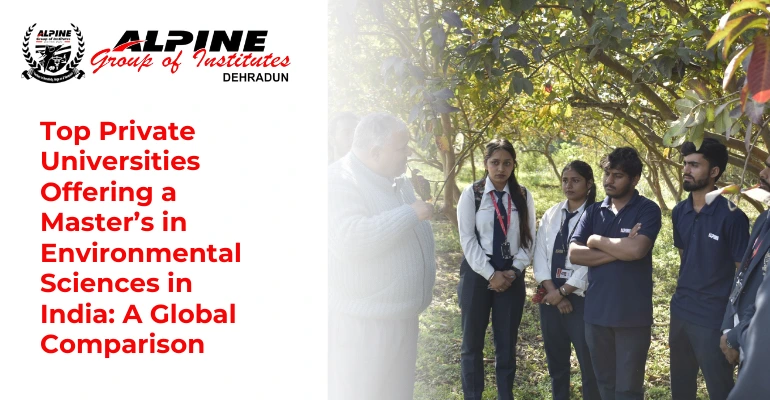Top Private Universities Offering a Master’s in Environmental Sciences in India: A Global Comparison
2024-12-16 10:11Top Private Universities Offering a Master’s in Environmental Sciences in India: A Global Comparison

Top Private Universities Offering a Master’s in Environmental Sciences in India: A Global Comparison
As the environmental challenges facing the world continue to grow, there is an increasing demand for professionals equipped with the expertise to address issues like climate change, resource depletion, and pollution. A Master’s in Environmental Sciences offers a comprehensive approach to tackling these global issues and provides opportunities for students to make meaningful contributions to sustainable development. In India, several private universities are offering world-class programs in environmental sciences, preparing students for impactful careers.
1. Shiv Nadar University, Noida
Program Overview:
Shiv Nadar University offers an M.Sc. in Environmental Science and Engineering, focusing on understanding the scientific and technological aspects of environmental management. The program combines rigorous coursework with research-driven learning, providing a foundation in environmental science, pollution control, and sustainable technologies.
Key Features:
- Strong emphasis on environmental engineering, sustainability technologies, and climate change.
- Opportunities for hands-on learning through fieldwork and internships with industry partners.
- The university is home to an advanced Environmental Science and Engineering Laboratory, fostering innovation in environmental technologies.
Strengths:
- The program is unique for its strong emphasis on technology-driven solutions for environmental challenges, making it ideal for students interested in sustainable engineering and innovation.
- Shiv Nadar University has a robust research culture, offering students opportunities to engage in cutting-edge research on topics such as renewable energy, environmental monitoring, and pollution control.
2. Ashoka University, Sonipat
Program Overview:
Ashoka University offers a Master’s program in Environmental Studies that integrates a deep understanding of environmental science with social sciences and policy studies. The program aims to develop well-rounded professionals capable of tackling both the scientific and societal dimensions of environmental problems.
Key Features:
- Focus on sustainable development, environmental policy, and biodiversity conservation.
- Interdisciplinary approach combining natural sciences with policy analysis and socio-environmental studies.
- Emphasis on research and fieldwork with local and global environmental organizations.
Strengths:
- Ashoka University’s interdisciplinary approach makes it one of the best choices for students who want to combine scientific research with a deeper understanding of environmental governance and societal impacts.
- The program offers a balanced mix of theory and practical experience, with collaborations with NGOs, government agencies, and international organizations.
3. O.P. Jindal Global University (JGU), Sonipat
Program Overview:
O.P. Jindal Global University offers an M.A. in Environmental Law and Policy under its Jindal Global Law School. While the program is focused on the legal aspects of environmental governance, it combines environmental sciences with policy and legal frameworks to provide a holistic understanding of environmental challenges.
Key Features:
- Interdisciplinary approach combining law, policy, and environmental science.
- Strong focus on environmental regulation, policy-making, and sustainable development.
- Collaboration with global institutions and international environmental organizations for research and field-based projects.
Strengths:
- JGU’s program is unique for integrating environmental law with environmental sciences, offering students the opportunity to specialize in environmental policy, sustainability, and climate change law.
- The university has strong global ties and offers opportunities for students to engage with international environmental policies and law.
4. Alpine Group of Institutes, Dehradun
Program overview
Offers a Master of Science (M.Sc.) in Environmental Science (EVS) through its dedicated Environmental Science Department, affiliated from HNB Garhwal, Central University . The course is designed to equip students with advanced knowledge in environmental sciences, preparing them for careers in environmental research, policy-making, conservation, and sustainable management. The M.Sc. EVS program aims to address the increasing demand for skilled professionals who can tackle pressing environmental issues, such as pollution, climate change, biodiversity loss, and resource depletion.
Key Features:
- Comprehensive Curriculum: The M.Sc. in Environmental Science at Alpine Group of Institutes offers a well-rounded curriculum that integrates core environmental science topics with aspects of sustainability, management, policy, and law. This interdisciplinary approach equips students with the knowledge to address a wide range of environmental challenges.
- Practical Learning: The course emphasizes fieldwork and laboratory training, ensuring that students gain hands-on experience in real-world environmental issues. Students are encouraged to participate in internships with environmental agencies, NGOs, and industries to further develop their practical skills.
Strengths:
Experienced Faculty: The program is delivered by a team of experienced faculty members who are experts in various areas of environmental science. The faculty’s expertise ensures that students receive quality instruction and guidance throughout the course.
State-of-the-Art Laboratories: The institute provides modern labs equipped with advanced tools for environmental analysis, pollution monitoring, and other research activities.
Industry Linkages: The course benefits from strong links with environmental organizations, government agencies, and industries, providing students with exposure to the practical side of environmental science.
Practical Exposure: Students engage in fieldwork, research projects, and internships with environmental organizations, providing practical experience in real-world environmental challenges.
4. Manipal University, Manipal
Program Overview:
Manipal University offers a Master of Science (M.Sc.) in Environmental Sciences with a focus on both the scientific and managerial aspects of environmental sustainability. The program provides in-depth knowledge in areas such as ecology, conservation biology, and environmental management.
Key Features:
- Comprehensive curriculum covering environmental biology, pollution control, and sustainable development.
- Opportunities for field research, laboratory work, and internships with leading environmental organizations and industries.
- Access to the Manipal Centre for Environmental Management, which provides students with exposure to cutting-edge research and practical applications in environmental management.
Strengths:
- Manipal University offers a strong foundation in ecological studies, making it ideal for students interested in conservation and biodiversity.
- The program provides excellent hands-on learning through its research centers and field-based projects, preparing students for real-world environmental challenges.
5. Lovely Professional University (LPU), Phagwara
Program Overview:
Lovely Professional University offers an M.Sc. in Environmental Science, which provides a comprehensive understanding of environmental issues from both a scientific and management perspective. The program covers a wide range of topics, from pollution control to sustainable resource management and climate change.
Key Features:
- Strong emphasis on sustainable development, natural resource management, and environmental pollution control.
- Offers a global perspective, with collaborations with international organizations and universities for research and internships.
- Well-equipped laboratories and research centers focused on environmental monitoring and technology.
Strengths:
- LPU’s program stands out for its focus on environmental management and policy, preparing graduates to tackle environmental challenges from a management and policy-making perspective.
- The university’s vast network of industry partners and global affiliations offers students opportunities for international exposure and practical experience.
Global Comparison: Private Universities in India vs. Top International Institutions
While India has several strong private universities offering Master’s programs in Environmental Sciences, it is essential to compare these programs with those offered by top global institutions. Let’s look at the differences and similarities between private Indian universities and renowned global universities in this field.
1. Program Structure
- Indian Universities: Programs like those at Shiv Nadar University, Ashoka University, and Manipal University offer a comprehensive mix of natural sciences, policy studies, and practical experiences, with strong fieldwork components. These universities focus on making students industry-ready, combining theory with hands-on learning.
- Global Universities: Institutions such as UC Berkeley, Oxford, and Stanford tend to offer more specialized programs with greater emphasis on research, innovation, and global sustainability challenges. These programs often include cutting-edge research and technology, as well as collaboration with international environmental organizations.
2. Research and Fieldwork Opportunities
- Indian Universities: Universities like Ashoka and Shiv Nadar provide excellent research opportunities in environmental science, sustainability, and policy, with exposure to real-world issues through internships and field projects.
- Global Universities: Leading global universities, such as ETH Zurich, Stanford, and Oxford, often provide more extensive research opportunities with access to advanced laboratories, funding for international fieldwork, and collaborations with top research institutions and governments worldwide.
3. Global Recognition and Rankings
- Indian Universities: While private universities like Shiv Nadar University and Ashoka University are gaining recognition for their quality education, they are still growing in terms of global ranking. However, their focus on high-quality research, technology, and collaboration with international organizations makes them competitive on a national level.
- Global Universities: Universities like Stanford, UC Berkeley, and Oxford are consistently ranked among the top institutions worldwide for environmental sciences, often attracting top talent from across the globe. They offer unparalleled resources, faculty expertise, and a global network of alumni.
4. Career Opportunities
- Indian Universities: Graduates from private Indian institutions often find opportunities in India’s rapidly growing environmental sector, especially in sustainability, environmental consulting, and policy. There is also a growing demand for environmental professionals in India’s corporate and governmental sectors.
- Global Universities: Graduates from top global institutions typically have access to a broader range of international career opportunities, from working with international environmental agencies to contributing to global sustainability research and corporate responsibility initiatives.
Conclusion
Private universities in India, such as Shiv Nadar University, Ashoka University, Manipal University, and Alpine Group of Institutes, offer strong programs in Environmental Sciences, providing students with a robust foundation in both the science and management of environmental challenges. These programs combine cutting-edge research, technology, and policy studies with real-world exposure, making them competitive on both national and international levels.
However, compared to global leaders like Stanford, UC Berkeley, and Oxford, Indian institutions are still emerging in terms of global recognition. Still, they offer unique opportunities to address environmental issues within the Indian context, which is especially valuable as India faces rapid environmental challenges.
For students looking to make a significant impact in the field of environmental science, choosing a program from one of these top private universities in India is a smart move—whether it’s preparing for national environmental challenges or seeking opportunities on a global scale.





